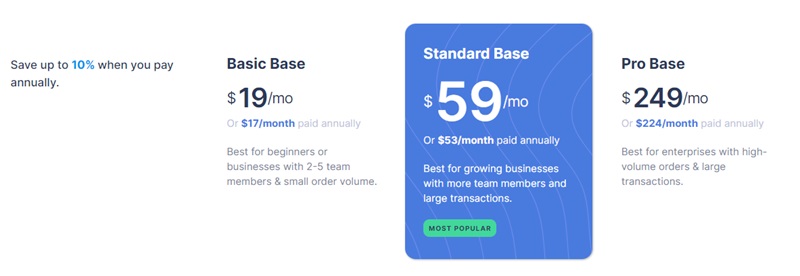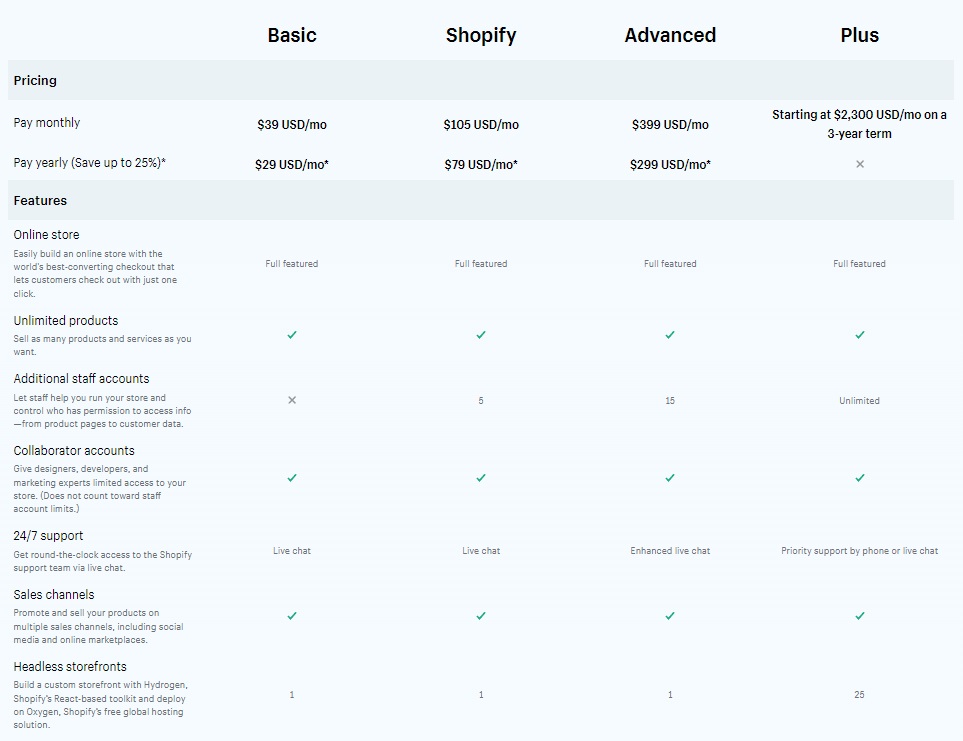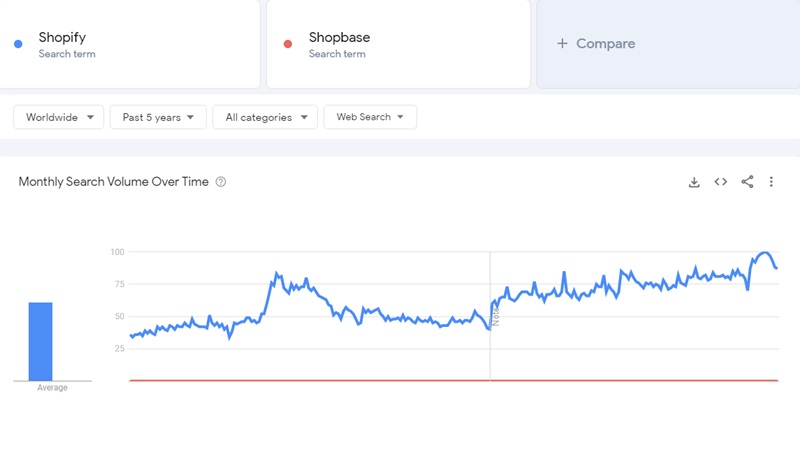Choosing the right eCommerce platform is pivotal for the success of your online business.
The competition remains fierce, particularly between Shopify and ShopBase.
Both platforms offer unique strengths, catering to diverse business needs.
From personal experience and thorough exploration of both services – supplemented by insights from various users – this review dives deep into what Shopify and ShopBase have to offer, and which may serve your business needs best.
Quick Summary Of Shopify Vs Shopbase
| Are there any free trials? | Shopify has a free trial and so does Shopbase |
| Customer Reviews For Shopbase | 4.6 Out Of 199 Reviews |
| Customer Reviews For Shopify | 4.5 out of 5 based on 6,280 customer users |
| How easy to get started | When signing up I felt they both were simple and offered help |
| My 2 Cents | You definitely want to try and test both. But, I’m a larger fan of how updated and fresh the whole ecosystem of Shopify is to start. |
Try Shopbase Free or Try Shopify Free
Platform Overview
Shopify has solidified its place as a frontrunner in eCommerce solutions, providing an extensive suite of tools for a variety of business models.
It’s a robust platform that supports omnichannel selling and is lauded for its integrations and business management features.
ShopBase, on the other hand, targets a more niche market with a focus on dropshipping and print-on-demand models.
It is particularly aligned with the needs of beginners in the e-commerce space, offering a more guided and narrowly focused experience.
Popularity Of Shopify and Shopbase Based Off Google Trends
Now of course we don’t base it off of this.
But it’s interesting to see which one is more popular and who has the most searches.
In theory, you might say more search terms the better because maybe a more active ecosystem of the platform which could be good.
A Breakdown Of Each
Shopify:
- Multi-faceted E-commerce: Beyond basic online store functionality, Shopify enables selling across multiple channels including social media and marketplaces like Amazon and eBay.
- Comprehensive Tools: A strong suite of business management tools, SEO capabilities, and various integrations set Shopify apart.
- Analytics: Their advanced reporting offers deep insights into business performance.
- User Experience: A more complex platform, Shopify offers detailed customization which might pose a learning curve.
ShopBase:
- Focused Functionality: With built-in dropshipping and POD features, it’s catered to beginners.
- Easy to Use: A user-friendly backend and simpler store-building tools make it approachable.
- Sales Tools: In-platform tools for upselling and cross-selling are available without additional integrations.
- Support and Community: Notably strong customer support and resources ideal for newcomers to e-commerce.
Pricing Plans and Value for Money
Let’s check out both of these plans and see how they look.
Shopbase

Base Plan – $17 Monthly
- Who it’s for: Newbies making their debut in the eCommerce world or small businesses looking to find their footing online.
- What you get: This is your entry-level package, giving you access to essential features like website creation, basic SEO settings, and the ability to list unlimited products. It’s a solid starting point without breaking the bank.
- UX Highlight: The simplicity here is key. You’re not overwhelmed with advanced features from the get-go, making it easier to focus on setting up a user-friendly site.
Standard Plan – $53 Monthly
- Who it’s for: Growing businesses that have their basics down and are ready to take things up a notch.
- What you get: On top of everything in the Base Plan, here you get enriched SEO options, access to the ShopBase marketplace, and enhanced customization features. This plan’s about growth, and its features reflect that.
- UX Highlight: Enhanced customization means you can start to really refine the user experience, making your site not just functional but also engaging and reflective of your brand.
Pro Plan – $249 Monthly
- Who it’s for: E-commerce veterans looking to maximize their reach and fully leverage all that ShopBase offers.
- What you get: This is the ‘all-in’ package. You get advanced analytics, priority support, and the ability to dive deep into customization and integration. It’s for when you’re ready to leave no stone unturned in your quest for e-commerce dominance.
- UX Highlight: With advanced analytics, you can fine-tune the user experience based on real data. This means creating a site that’s not just beautiful but also incredibly intuitive and user-focused.
Shopify
Here’s a breakdown of the main plans:
Shopify Pricing Plans

Shopify Starter Plan:
-
- Ideal for individuals who are just starting out or businesses that operate on a small scale.
- Provides the fundamental features required for selling online without setting up a full-fledged website.
Basic Shopify Plan:
-
- Geared towards small businesses looking for an accessible entry into online retail.
- Includes all the essential features such as website creation, secure checkout, and basic SEO settings.
Shopify Plan:
-
- Serves growing businesses that seek additional features over the Basic plan.
- Offers professional reports, better rates on shipping and payments, and the ability to create gift cards.
Advanced Shopify Plan:
-
- Tailored for larger businesses that need advanced reporting and analytics.
- Provides the best rates on shipping and payment processing, as well as an advanced report builder.
Shopify Plus Plan:
-
- Aimed at high-volume merchants and enterprises requiring a robust, scalable platform.
- Offers advanced security features, customization options, and dedicated support.
Each subsequent plan offers increasingly nuanced features that cater to various business sizes and their particular requirements.
It’s important to consider the transaction fees, additional costs for apps, and whether the plan’s features align with the business’s operational strategy and scale.
Try Shopbase Free or Try Shopify Free
User Experience and Customization
When exploring Shopify and ShopBase, we can distill our comparison into two core areas:
user experience (UX) and customization capabilities.
User Experience (UX)
Shopify
- Ease of Use: Shopify shines with an intuitive interface, welcoming to both novices and experts.
- Support Resources: It boasts robust support with 24/7 coverage and a wealth of online documentation.
- Community: There’s a strong user community for shared knowledge and peer assistance.
ShopBase
- Streamlined Setup: ShopBase offers a clear setup, especially geared towards print-on-demand and dropshipping businesses.
- Focused Features: The platform has specialized tools that cater to its target audience, providing a more refined but less generic user experience.
Customization
Shopify
- Extensive App Marketplace: Users can extensively tailor their site functionality thanks to Shopify’s vast app ecosystem.
- Theme Flexibility: A diverse range of themes is available, although deep customization might require familiarity with Shopify’s Liquid code or hiring a developer.
- Third-Party Integrations: Shopify facilitates a broad spectrum of third-party integrations, enhancing the platform’s versatility.
ShopBase
- Niche-Specific Tools: ShopBase embeds niche-specific features, streamlining the customization process for its core users.
- Simplified Customization: The platform offers straightforward customization options, which can be a double-edged sword, providing ease but potentially limiting creativity.
In summary, Shopify offers a more generalist approach with a focus on extensive customization and user support, which suits a wide array of e-commerce businesses.
ShopBase, however, streamlines the experience for specific e-commerce models, which can be ideal for users in those niches seeking efficiency over breadth.
Designers and creatives must weigh these aspects against their project goals, ensuring the platform aligns with the desired user experience and scope of customization needed.
When to Use Each Platform
Shopify is recommended if you:
- Seek a scalable solution for a growing business.
- Require a wide range of integrations and features.
- Aim for a global multi-channel presence.
ShopBase is best if you:
- Are starting with dropshipping or print on demand.
- Prefer a straightforward, easy-to-learn platform.
- Want a platform with integrated selling tools.
Other eCommerce Alternatives to Consider
- WooCommerce: For those with WordPress websites, WooCommerce offers a familiar and flexible, yet powerful e-commerce solution.
- BigCommerce: A Shopify competitor with robust built-in features, catering to mid-size to larger businesses.
- Magento: For enterprises with complex needs and the resources for custom development.
Choosing the best platform is about aligning features with your business plan.
Shopbase vs. Shopify FAQ
What's the main difference between Shopbase and Shopify?
At its core, Shopbase focuses on dropshipping, print-on-demand, and white label services, making it a go-to for businesses looking to scale quickly without much inventory hassle. Shopify, meanwhile, offers a broader e-commerce platform suited for a wide range of business types, providing a robust set of tools for everything from small startups to large online stores.
Can I use my own domain name with both Shopbase and Shopify?
Both platforms allow you to connect your custom domain. This means you can maintain your brand identity, whether you decide to build your online store with Shopbase or Shopify.
How do Shopbase and Shopify handle payments?
Both Shopbase and Shopify support a variety of payment gateways, including major ones like PayPal, Stripe, and local options depending on your region. Shopify also offers its own payment solution, Shopify Payments, which is seamlessly integrated into the platform and might save you some transaction fees.
Is SEO a big deal on these platforms?
Yes, SEO is a key feature in both. Shopbase and Shopify understand the importance of ranking high on search engines. They offer SEO-friendly product pages, customizable meta tags, and automatic sitemaps. However, Shopify takes a slight edge with more advanced SEO tools and apps available directly through its marketplace.
Which platform offers the best templates and design flexibility?
Shopify wins when it comes to the sheer variety and sophistication of theme templates available. Their marketplace boasts a wealth of professionally designed themes, many of which are mobile-responsive. Shopbase, on the other hand, offers a more limited yet finely curated selection of templates, optimized for conversion, which is especially useful for dropshipping and print-on-demand businesses.
How do pricing plans compare between Shopbase and Shopify?
Shopbase offers competitive pricing, especially attractive for businesses looking to minimize startup costs. Their plans are straightforward and focus on the essentials needed for dropshipping and print-on-demand models. Shopify's pricing structure provides more tiers, including options for small businesses just starting out, up to large enterprises requiring advanced features and scalability. Remember, with Shopify, adding apps and customized themes can increase the overall cost.
What about customer support?
Both platforms pride themselves on offering solid customer support. Shopify has a large advantage with 24/7 availability through live chat, email, and phone. Shopbase also offers robust support but with more emphasis on self-service resources and community forums. Either way, you're well-covered.
Which platform is better for international selling?
Shopify has a global edge, supporting multiple languages and currencies right out of the box, making it a solid choice for businesses aiming for an international presence. Shopbase is catching up, offering features tailored to a global audience but with a primary focus on US and Western markets.
The Final Verdict and Alternatives
After breaking down both Shopify and ShopBase, the choice largely aligns with your business’s scale and focus.
Shopify leads for those looking for a full-fledged omnichannel presence with breadth and depth of features.
However, for those diving into dropshipping and print-on-demand with convenience in mind, ShopBase is a strong contender.
The post Shopify Vs Shopbase (Is Shopbase Better Than Shopify?) appeared first on Create A Website Today.
























